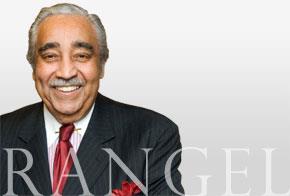
Did you see Sunday's Daily News story?
Check out what they wrote, then
share it with your friends on Facebook or
tweet about it.
Rep. Charles Rangel talks overcoming poverty, being wheelchair-bound and survival as he turns 84

Rangel is the quintessential American success story.
The son of a “no good” father and seamstress mother, he grew up desperately poor in 1930s Harlem. He and his older brother, Ralph, walked in shoes so full of holes they had to skip around glass on the sidewalk to avoid being cut.
“It’s hard to imagine how blessed, how lucky, how fortunate I have been from the life that I was born into on Lenox Ave.,” Rangel said during an interview in his congressional office last week.
His earliest memory of his absentee father is a painful one: Ralph Rangel was beating his mother, Blanche, on the steps of an apartment building.

Incensed, a then-5-year-old Rangel got a broom and started whacking his dad.
He attended DeWitt Clinton High School but dropped out his junior year to join the Army. He was motivated by his mother’s reaction when money from his older brother, who was then in the service, would arrive by mail.
“I could not believe how happy my mom was getting that check,” he said. Rangel was 20 when he and the other members of the all-black 503rd Field Artillery Battalion shipped off to Korea in 1950.
On the night of Nov. 29, his unit was surrounded by attacking Chinese forces in the village of Kunu-ri. For three days, Rangel and his fellow soldiers were pinned down, mortars exploding all around them.
Despite suffering shrapnel wounds, Pvt. 1st Class Rangel lived up to his nickname of “Sarge” and led 40 of his comrades for three days behind enemy lines into safety.
Rangel was awarded a Purple Heart and a Bronze Star for valor. The near-death experience inspired the title of his memoir, “And I Haven’t Had a Bad Day Since.”
“If you’re involved in a nightmare of tens of thousands of Chinese screaming and shooting and flares and the darkness and a horrible sight, and out of that like so many bad dreams, you wish it was a dream,” Rangel said.
“Well, it wasn’t a damn dream, and I survived it. What the hell could possibly happen to me that I would not believe that I am just one of the most blessed people?”
Back in New York, Rangel worked in menial jobs, but with the help of the G.I. Bill, he graduated from New York University. He then got his law degree at St. John’s University and landed a job as a federal prosecutor.
It was a stunning turnaround. At 22, he was making peanuts pushing a hand truck through the Garment District. At 30, the high school dropout was a lawyer with three degrees.Rangel got an itch for politics. He served two terms in the state Assembly before deciding in 1970 that he would challenge Harlem congressman Adam Clayton Powell.

Rep. Charles Rangel, along with Rev. Al Sharpton and Rev. Herbert Daughtry were arrested while protesting the shooting of Amadou Diallo.
Rangel eked out a win by 150 votes.
With his gravelly voice and sartorial splendor, Rangel became one of Harlem’s most distinctive figures.
And in Congress, he developed a reputation as a skillful legislator and deal-maker with a knack for building alliances. He helped to spearhead legislation that has done everything from raise the national minimum wage to cut tax benefits to U.S. companies doing business in apartheid South Africa.
That measure, dubbed the Rangel Amendment, was considered one of the most effective anti-apartheid sanctions.
Rangel still remembers the welcome he received on a visit to South Africa just after Nelson Mandela was released from prison.
“He knew exactly who I was,” Rangel marvels.
...
If reelected, Rangel would be either the No. 1 or No. 2 House member in seniority. He promises that his next term would be his last. As he campaigns, he shows no signs of anxiety or concern or sentimentality.
He seems to be having fun.
“It’s difficult to walk the streets without being stopped,” he says, “and these cell phones make everyone a photographer, you know?”
On a recent day, Rangel appeared at the Wilson Major Morris Community Center on W. 152nd St., where he talked about the importance of providing services to the elderly.
Among the two dozen seniors listening was Anne Burley, who first met Rangel during his first congressional campaign in 1970, when he spoke at the famed Abyssinian Baptist Church. “I was in awe of him,” she said.
Burley thought she had seen the last of Rangel when he appeared at an event two years ago in a wheelchair. “I thought he was on his way out,” Burley added, “but he looks like he has been to the Fountain of Youth.”
Are you excited to support Charlie Rangel?
Share it with your friends on Facebook or
tweet about it.
Thank you,
Rangel for Congress

